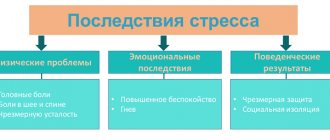Stress can be destructive to our health. The consequences of frequent experiences affect the functioning of all organs and systems.
For example, the skin may become dry and pale, with a yellow tint. The risk of cardiovascular disease also increases significantly. Cystitis, incontinence and much more can occur due to nervousness. And most importantly, stress accelerates the aging process - both external and internal.
Therefore, it is important for modern people to know the signs of stress in order to prevent its consequences or eliminate them as early as possible.
Signs of stress
According to statistics, in Russia women are more susceptible to stress due to their increased emotionality and sensitivity. In 2021, people of all professions experienced strong negative experiences, but especially teachers, entrepreneurs and, of course, doctors.
This year has been difficult for many, so the number of people with chronic stress has increased many times over. At the same time, people began to consider their depressed state as the norm. But even in the most difficult times, it is important not to let the situation get worse and fight back the disease.
Stress changes the entire body, so you should pay attention to different symptoms.
Behavioral signs of stress:
- conflict;
- aggressiveness;
- irritability;
- loss of interest in life, friends, appearance;
- decreased self-esteem;
- suspicion;
- frequent attacks of anger and feelings of helplessness.
Lifestyle changes:
- sleep disturbance;
- the emergence of bad habits;
- increased fatigue;
- decreased performance.
Intellectual traits:
- poor concentration;
- excessive distractibility;
- decrease in attention.
Changes in thinking:
- decreased creativity and memory;
- violation of logic;
- common spelling errors.
Physiological signs:
- frequent headaches;
- cardiopalmus;
- decreased immunity;
- sudden weight loss or, conversely, rapid weight gain;
- deterioration of organ function.
call me back
Symptoms of stress in women
Symptoms of stress can be expressed both in the psycho-emotional state of a woman and in somatic disorders:
- Irritability, mood swings, anger, dullness, isolation, feeling of loneliness.
- Headaches, disruptions in the functioning of the cardiovascular system.
- Muscle tension.
- Increased sweating.
- Menstrual irregularities, possible development of thrush.
- Skin itching, possible rash.
- Suspicion.
- Low self-esteem, lack of self-confidence.
- Poor appetite, problems sleeping.
- Alcohol abuse.
Types of stress
Conventionally, two types of stress can be distinguished.
- Eustress is “good” stress that does not harm a person. Without it, we would always feel calm, at ease and would not want to achieve anything. We feel eustress when we need to get out of our comfort zone and change something in our life. A simple example: you have undertaken to create a large-scale project that requires a lot of time, effort, intellectual and physical expenditure. It’s difficult for you, you’re nervous, but at the same time you feel that in the end you’ll get a pleasant feeling of pride in yourself, you’ll be praised, and all your efforts will not be in vain. Thus, eustress motivates us not to give up and move forward despite difficulties.
- Distress is harmful and occurs when stress reaches a large scale: it lasts for a long time and has several foci of occurrence. For example, when a person has to cope with several difficult and unpleasant tasks at once: a change of environment, joining the army, lack of sleep, financial losses.
Distress has an extremely negative impact on the human psyche and physiology. He stops being happy, receiving positive emotions and is constantly dissatisfied with his life. Signs of distress include sudden changes in mood, physical weakness, poor performance, and the emergence of negative thoughts.
Types of distress
- Emotional. It is associated with a person experiencing a very strong emotional state (both positive and negative). For example, the birth of a child, a promotion at work, a new trip, or, conversely, a breakup, the death of a loved one.
- Physiological. Directly affects body tissues. It can be caused by climatic (cold, heat, thunderstorm), chemical (deficiency or increased oxygen content in the air) or physical factors (overexertion, injury). These triggers do not go unnoticed. Even after everything has returned to normal, a person experiences apathy, overwork, and constant fatigue for some time.
- Chronic. This is a long-term adaptive reaction of the body to negative influences from the environment. It is the most dangerous type of stress. It can arise from overwork at work, as a result of family quarrels, etc. The consequences can be a change in the size of the brain, its structure and work in general. Leads to various types of diseases (neurosis, heart disease, vascular disease).
- Nervous. Characterized by excessive stress emotionally and physically. A person cannot control his emotions and behaves aggressively and hot-tempered.
Causes
There are a number of reasons that can trigger nervous stress.
The most common factors contributing to the development of stress in women include:
- loneliness;
- loss of a loved one;
- problems in personal relationships;
- somatic diseases;
- troubles at work;
- financial troubles.
A painful reaction to the above factors is also typical for men, but women are more vulnerable to stress in such situations.
Stages of stress
- 1. Anxiety. A person is scared, a signal is sent to the hypothalamus - there is an active production of adrenaline, cortisol, norepinephrine. As a result, the pulse and breathing increase.
- 2. Adaptation. The body is trying to bounce back and normalize its functions. If it doesn’t work out, then it goes to the third stage.
- 3. Exhaustion. The body does not have the strength to fight on its own, so nervous breakdowns, depression, and other diseases develop and manifest themselves. A specialist should be involved in getting out of this state.
Chemistry of stress
The body's response to stress is controlled by the hypothalamus and adrenal glands. When detecting a stressful situation, the body releases certain hormones. Adrenaline and norepinephrine are produced in the adrenal glands at the first sign of danger. It increases during anxiety and shock, causing the heart rate to increase and the pupils to dilate.
Norepinephrine is released in any shock situations. Its action is associated with an increase in blood pressure.
Cortisol levels rise during extreme situations or physical activity. In small doses it does not affect the body. But long-term exposure to this hormone causes damage to the brain, literally shrinking it in size. High amounts of cortisol cause a loss of synaptic connections between neurons and a shrinkage of the prefrontal cortex, which regulates concentration, decision-making, judgment and social interaction.
Prolactin especially affects women whose target organ is the mammary glands. In a situation of severe stress, the release of this hormone begins, as a result of which metabolic problems begin.
Corticoliberin activates the center of fear and anxiety, causes anorexia, and increases blood pressure.
Sign up for a consultation
Consider our dichotomy between “running long distances on the savannah” and “worrying about the mortgage.” We will look at how the process of forming and retrieving memories is disrupted when stressors become too strong or for too long. Learning and memory scientists call this an inverted U-shaped relationship. When we move from a state of rest to a state of moderate, short-term stress, activation occurs and memory improves. Then, with the transition to severe stress, memory deteriorates.
This memory impairment has been shown in numerous studies on laboratory rats for a variety of stressors - limited mobility, electric shock, the smell of a cat. The same results were obtained when, instead of stressors, rats were given large doses of glucocorticoids. But this may not give us anything interesting. Severe stress or a lot of glucocorticoids can simply have a negative effect on the brain as a whole. It is possible that rats in this condition would score poorly on tests of motor coordination, speed of response to sensory stimuli, etc. But careful control studies showed that other aspects of brain function, such as implicit memory, remained at normal levels. It may not be that learning and memory are impaired, but that the rat is so focused on or so disturbed by the smell of the cat that it simply cannot successfully complete other tasks. In terms of explicit memory, the memory retrieval function appears to be more vulnerable to stress than the formation of new memories. Similar results were reported by the authors of studies on monkeys.
What's going on with people? Almost the same (Fig. 38). In a disorder called Cushing's syndrome, a person develops a tumor and this leads to the production of tons of glucocorticoids. Think about what's wrong with the next patient with Cushing's syndrome. High blood pressure, diabetes, immune suppression, problems with the reproductive system. That's half the content of this book. It has been known for decades that these patients have memory problems, especially explicit memory, called Cushingoid dementia. As we saw in Chapter 8, synthetic glucocorticoids are often prescribed to treat autoimmune disorders or inflammatory diseases. Long-term use also causes problems with explicit memory. But maybe this is due to the disease, and not due to the use of glucocorticoids? Pamela Keenan of Wayne State University studied patients with inflammatory diseases and compared those treated with steroidal anti-inflammatory drugs (i.e., glucocorticoids) with those treated with nonsteroidal drugs; It turns out that memory problems are a function of glucocorticoid use and not the disease.
Rice. 38. Aspiring businessman Billy Sloan will soon discover that prolonged stress impairs his memory.
As the clearest evidence yet, explicit memory deteriorates in healthy volunteers after several days of taking high doses of synthetic glucocorticoids. One problem in interpreting these studies is that synthetic hormones work a little differently than the real thing, and the doses the subjects took resulted in higher levels of glucocorticoids in the blood than the body normally produces, even during times of stress. What is important here is that stress itself, or the “injection” of stress in the form of glucocorticoids, which occurs naturally in humans, also impairs memory. As in animal studies, implicit memory remains at the same level, and the function of retrieving information from the past rather than creating new memories is more vulnerable.
There are also results (although much smaller) showing that stress impairs something called executive function. It's a little different from memory. It is not about the cognitive realm of storing and retrieving facts, but about what we do with facts—whether we organize them strategically as the basis for our judgments and decision-making processes. This function is associated with an area of the brain called the prefrontal cortex. We'll talk about this in more detail in Chapter 16, when we look at how stress can affect decision-making and impulse control.
Negative effects of stress on the hippocampus
How does long-term stress affect hippocampal memory? This process has been well studied in laboratory animals.
First, hippocampal neurons stop working normally. Stress can disrupt long-term potentiation in the hippocampus even in the absence of glucocorticoids (as in the adrenalectomized rat). Apparently, this occurs due to very strong excitation of the sympathetic nervous system. However, the main research in this area has focused on glucocorticoids. Once glucocorticoid levels move from the range typical of mild stressors to the range typical of severe stress, the hormone no longer promotes long-term potentiation, the process by which the connection between two neurons “remembers” something and becomes more excitable. Instead, glucocorticoids now disrupt this process. In addition, high levels of glucocorticoids also exacerbate what is known as long-term suppression, a mechanism that may underlie the process of forgetting that is the opposite of the hippocampal “aha” response.
How is it that a small increase in glucocorticoid levels (during a mild stressor) does one thing (strengthen the potentiation of communication between neurons), but a large increase in glucocorticoid levels does the exact opposite? In the mid-1980s, Ron de Klet of the University of Utrecht in the Netherlands discovered a very elegant answer. It turns out that there are many glucocorticoid receptors in the hippocampus and there are two types of these receptors. It turned out that the hormone binds about ten times better to receptors of the first type (they were called “high-affinity” receptors) than to receptors of another type. This means that if glucocorticoid levels are only slightly elevated, the effects of these hormones in the hippocampus are controlled by high-affinity receptors. Conversely, if we are dealing with a strong stressor, the hormone activates low-affinity receptors. And, quite logically, it turns out that activation of high-affinity receptors improves long-term potentiation, while activation of low-affinity receptors leads to the opposite results. This forms the inverted U-shaped relationship that we discussed above.
We noted in the previous section that an area of the brain called the amygdala plays a central role in the types of emotional memories associated with anxiety. But the amygdala plays an important role here too. Its activity increases when exposed to a strong stressor, and it sends a lot of neural projections to the hippocampus. It is possible that activation of this pathway causes stress to begin to disrupt the functioning of the hippocampus (Figure 39). Damage a rat's amygdala or sever its connections to the hippocampus, and stress will no longer impair hippocampal-related memory, even with elevated glucocorticoid levels. This explains the finding, which brings us back to the topic of physiological stress signatures, and also demonstrates that an activity can challenge physiological allostasis without being psychologically negative. For example, sex increases glucocorticoid levels in male rats without activating the amygdala or disrupting the functioning of the hippocampus.
Secondly, neural networks lose connectivity. If we return to the diagram of “impressionist neurons” (see Fig. 36), we will see on it the symbols indicating how one neuron speaks to another, sending “projections” to it. As we said a few paragraphs below this diagram, these projections are very real - they are long, branching processes extending from neurons, forming synapses with the branching processes of other neurons. These processes (axons and dendrites) are apparently responsible for communication between neurons and the formation of neural networks. Bruce McEwen showed that in rats, after just a few weeks of constant stress or after the administration of large doses of glucocorticoids, these processes begin to dry out, become depleted and lose coherence. The same thing may happen in the primate brain. In this case, synaptic connections are interrupted and the complexity of neural networks is reduced. Fortunately, it appears that at the end of a stressful period, neurons can recover and re-establish connections with each other.
Rice. 39. Neurons of the rat hippocampus. On the left are healthy neurons; on the right - neurons and their processes depleted by prolonged stress
This temporary atrophy of neural processes likely explains the pattern of memory problems during chronic stress. When large areas of neurons in the hippocampus are destroyed after a major stroke or in the late stages of Alzheimer's disease, memory is greatly impaired. Memories may disappear completely, and a person cannot remember, for example, the name of his wife. If during chronic stress the neural network “weakens” and the “branches” of the neural “trees” begin to dry out, then the memories of the name of Toulouse-Lautrec do not disappear anywhere. You just have to remember it longer and create more associations for it, because all the networks involved in this process work less efficiently. The memories aren't lost, they're just harder to access.
Third, the formation of new neurons is suppressed. If you had studied basic neuroscience in the last thousand years, you would have been told over and over again that the adult brain does not create new neurons. It has recently become clear that this opinion is completely wrong¹. Therefore, research into “adult neurogenesis” has become one of the hottest topics in neuroscience today.
________________________________________________________
¹ Evidence of new neurons in the adult brain was first found by a group of pioneering scientists in the 1960s. These people were ignored for a long time, and some of them were even forced to leave science. Finally their discoveries received recognition.
Two features of such neurogenesis are directly relevant to the topic of this chapter. First, the hippocampus is one of two parts of the brain where new neurons are formed². Second, the rate of neurogenesis may vary. Learning, a stimulus-rich environment, exercise or estrogen increase the rate of neurogenesis, and the strongest inhibitors identified so far are, as would be expected, glucocorticoids and stress, even if it lasts only a few hours, at least in rats.
Two key questions arise. First, when stress is removed, does neurogenesis recover, and if so, how quickly? We don't know that yet. Second, what are the consequences of stress reducing the capacity for neurogenesis in adult humans? Related to this question is another: why do adults need neurogenesis? The issue is hotly debated, with opponents publicly battling each other in scientific conference arenas. In one corner of the ring are researchers who propose that under the right conditions, active neurogenesis can occur in the hippocampus, new neurons form connections with other neurons, and these new connections are actually necessary for certain types of learning. Opponents in the other corner of the ring stubbornly reject these ideas. Over to the referee.
Fourth, hippocampal neurons are at risk. As we have already said, a few seconds after the onset of stress, the flow of glucose into the brain increases. What if the stress continues? After approximately 30 minutes of continuous exposure to the stressor, glucose supply stops increasing and returns to normal levels. If stress continues, the supply of glucose to the brain is even reduced, especially in the area
__________________________________________________________
² Another area supplies new neurons to the olfactory system; for some strange reason, the neurons responsible for processing odors die quickly and need to be constantly replaced. It turns out that in the early stages of pregnancy there is a real explosion in the production of new olfactory neurons. They mature just in time for birth, and the scientists who discovered this phenomenon believe that these new olfactory neurons are necessary for imprinting the baby's smell (which is very important for the mother in most mammals). What happens in the early stages of pregnancy when new olfactory neurons are produced? I'm willing to bet that this process has something to do with the famous pregnancy nausea, aversion to certain foods and increased olfactory sensitivity. This has nothing to do with stress, but is so interesting that I had to mention it.
hippocampus It decreases by about 25%, and this is due to glucocorticoids².
Reducing the flow of glucose into a healthy, happy neuron does not lead to any special consequences. The neuron simply experiences slight nausea and dizziness. But what if the neuron is not healthy and happy, but is experiencing a neurological crisis? In such a situation, the likelihood of his death increases.
Glucocorticoids will compromise the ability of hippocampal neurons to survive a series of negative stimuli. Take a rat, give it a violent seizure, and the higher its glucocorticoid levels during the seizure, the more hippocampal neurons will die. The same goes for cardiac arrest, when the supply of oxygen and glucose to the brain stops, or stroke, when a single blood vessel in the brain becomes blocked. The same goes for traumatic brain injuries or drugs that produce oxygen radicals. Alarmingly, much the same thing happens in rats with the same neuronal damage seen in Alzheimer's disease (when the neuron is exposed to toxic protein fragments associated with Alzheimer's disease, called amyloid beta). The same applies to the equivalent of AIDS dementia in the hippocampus of rats (when a neuron is exposed to the AIDS virus protein gpl20)³.
______________________________________________________
² I emphasize again and again how important it is during times of stress to reduce the supply of energy to those parts of the body that are not very important during stress and direct it to the working muscles. In the previous section, we added the hippocampus to the list of places that receive more energy with the onset of stress. It seems wise to continue to supply it with energy if the stress turns out to be prolonged. Why does the supply of glucose to the hippocampus eventually stop? Probably because, over time, we begin to act more and more automatically, relying on implicit memory to guide reflexive actions—a karate move to take out a terrorist, or at least a good hit with a racquet during a softball game at a company picnic that you've been so excited about. unnerving. Thus, reducing the supply of glucose to the most “refined” parts of the brain, such as the hippocampus and cortex, may be a means of redirecting energy to more reflective areas of the brain.
³ In Chapter 3 we talked about how stress can be an indirect cause of stroke or cardiac arrest. But for other neurological problems—seizures, traumatic brain injuries, AIDS dementia, and most importantly, Alzheimer's disease—there is no evidence that stress or glucocorticoids cause these disorders. They are more likely to worsen pre-existing conditions.
My laboratory and other researchers have shown that relatively mild energy problems, caused by glucocorticoids or stress preventing glucose from being stored, reduce a neuron's ability to cope with the effects of neurological disorders. All of these neurological diseases are essentially energy crises for the neuron: cut off the supply of glucose to the neuron (hypoglycemia), cut off both glucose and oxygen (ischemia-hypoxia) or force the neuron to work in a crazy mode (convulsive attack), and the amount of accumulated energy will drop sharply . Destructive waves of neurotransmitters and ions will begin to flow in the wrong places, and oxygen radicals will begin to form. If we add glucocorticoids to this situation, the neuron will not be able to put all this chaos in order. Due to a seizure or stroke, that neuron has the worst day of its life and goes into crisis with 25% less energy in the bank than usual.
Finally, there is already evidence that prolonged stress or elevated glucocorticoid levels over a long period of time can actually kill hippocampal neurons. The first evidence of this began to emerge in the late 1960s. Two researchers have shown that when guinea pigs are exposed to pharmacological levels of glucocorticoids (that is, higher levels than the body normally produces on its own), they experience brain damage. Surprisingly, this damage is mostly limited to the hippocampus. This was around the time that Bruce McEwen first reported that the hippocampus had receptors for glucocorticoids, but no one had yet realized that the hippocampus was the center of glucocorticoid activity in the brain.
Since the 1980s, various researchers, including myself, have shown that this “glucocorticoid neurotoxicity” is not only a pharmacological effect, but is also characteristic of the normal process of brain aging in rats. Overall, studies have shown that exposure to high doses of glucocorticoids (in the range found during stress) or exposure to severe stress accelerates degeneration of the aging hippocampus. Conversely, reducing glucocorticoid levels (by removing the adrenal glands in rats) delays hippocampal aging. And as can be expected at this point, the degree of exposure to glucocorticoids throughout life in rats determines not only the severity of hippocampal degeneration in old age, but also the severity of memory problems.
In what areas of the brain do glucocorticoids and stress destroy brain cells? Sure, stress hormones can cause illness in a variety of ways, but is neurotoxicity a serious factor? After ten years of research, we still don't know for sure.
Damage to the human hippocampus
We have already discussed in this chapter that excess stress and/or glucocorticoids can impair the functioning of the hippocampus. Is there any evidence that this may lead to the organic damage to the hippocampus that we discussed? That is, could it sever neural networks due to atrophy processes, prevent the formation of new neurons, lead to neuron death due to other neurological disorders, or simply kill neurons outright?
To date, six key findings from human studies have raised some concerns.
Cushing's syndrome. As we have already said, Cushing's syndrome is associated with the development of a tumor, which leads to the production of very large amounts of glucocorticoids. One consequence of this is the deterioration of hippocampus-related memory. Monica Starkman of the University of Michigan uses brain scanning techniques in patients with Cushing's syndrome to determine the overall size of their brain and the size of its regions. She reports that these individuals exhibit a selective reduction in hippocampal volume. In addition, the higher the glucocorticoid level, the greater the loss of hippocampal volume and the greater the memory problems.
Post-traumatic stress disorder (PTSD). As we will see in Chapter 15, this anxiety disorder can develop as a result of a wide variety of traumatic stressors. Research by Douglas Bremner of Emory University and others shows that people with PTSD due to repeated trauma (as opposed to those who have experienced a single trauma)—for example, soldiers who have experienced serious combat multiple times, those who have been repeatedly exposed to violence in childhood, the volume of the hippocampus is reduced. Again, the volume reduction is confined to the hippocampus, and at least one of these studies found that the longer the history of injury, the smaller the hippocampal volume.
Major depression. As we will see in Chapter 14, major depression is closely related to long-term stress. About half of patients with major depression have elevated glucocorticoid levels. Yvette Sheline of the University of Washington and others have shown that long-term major depression is also associated with reduced hippocampal volume. The longer the history of depression, the greater the loss of volume. In addition, patients with the subtype of depression most associated with elevated glucocorticoid levels had the smallest hippocampal volume.
Constant jet lag. In Chapter 11, we look at a single, but very interesting, study of airline employees experiencing jet lag on intercontinental flights. This study found that the shorter the average recovery time after each jet lag, the smaller the hippocampal volume and the more memory problems.
Normative aging. The work of Sonia Lupien of McGill University and others looked at healthy older adults. Measure their resting glucocorticoid levels, the size of their hippocampus, and the quality of their hippocampus-related memory. After a few years, repeat all these measurements. As we'll see in Chapter 12 on aging, there is some increase in resting glucocorticoid levels with age, although levels can vary widely among individuals. But overall, those whose glucocorticoid levels increased since the first study showed the most significant decreases in hippocampal volume and the most significant declines in memory.
Interactions between glucocorticoids and neurological disorders. Several studies have shown that, given the same severity of disorders, the higher the patient's glucocorticoid level at the time of admission to the clinic, the more severe his neurological symptoms.
All of these studies demonstrate that glucocorticoids damage the human hippocampus. But it's not that simple. There are some problems and complications here.
Some studies have shown that PTSD is associated with decreased glucocorticoid levels. Therefore, the hypothesis that excess hormones damage the hippocampus is incorrect. However, it appears that PTSD patients with low glucocorticoid levels exhibit excessive sensitivity to glucocorticoids. Thus, these hormones remain among the prime suspects.
Next question. It is unclear whether the decrease in hippocampal volume in PTSD is caused by the trauma itself or occurs in the posttraumatic period; There has been at least one excellent study on this topic that has brought new perspective to both of these ideas. Its authors suggested that the subjects had a small hippocampus even before PTSD and this increases the likelihood of developing PTSD after trauma.
Finally, it must be remembered that in studies of the aging process, purely correlational dependences are studied. In other words, it is possible that increased glucocorticoid levels with age lead to hippocampal atrophy. But there are equally good reasons to believe that the opposite is true: progressive hippocampal atrophy leads to increased glucocorticoid levels (as we will see in Chapter 12, this is because the hippocampus also helps reduce glucocorticoid production, and an atrophied hippocampus is not very good at this task ).
In other words, no one yet knows exactly what is happening. One of the biggest problems is the lack of research into the brain after death. A large post-mortem study could be done to show whether the volume of the hippocampus is shrinking because it has fewer millions of neurons, or because the connections between neurons and other neurons are fewer and shorter. Or both. If it turns out that there are fewer neurons in the hippocampus, then we could even say whether this is due to their death or because their formation is hampered. Or, again, both.
In fact, even without post-mortem studies, there are few clues about the reasons for the decrease in hippocampal volume. It turns out that if the tumor that caused Cushing's syndrome is removed and glucocorticoid levels then return to normal, the hippocampus begins to slowly restore its normal size. As we have already said, when glucocorticoids dry out the processes connecting neurons, this process is reversible - eliminate the excess glucocorticoids and the neurons will begin to recover. Thus, it is likely that the decrease in hippocampal volume in Cushing's syndrome occurs due to a slowdown in these processes. Conversely, hippocampal shrinkage in PTSD and major depression appears to be more permanent and does not recover in volume even decades after the injury and, in the case of major depression, years and decades after the depression has gone into remission following successful treatment. So in these cases, the decrease in hippocampal volume is probably not due to a slowdown in neuronal processes, because these processes are reversible.
Previous – Stress and Memory | The next one is a continuation...
Stress Prevention
Of course, stress is an integral part of life. But we can learn to manage it and prevent its devastating effects on our health.
For this, it is important to practice prevention. For example:
- Include foods rich in beneficial microelements in your diet. For example, magnesium plays an important role - one of the main helpers in the fight against stress; it reduces cortisol levels. Magnesium is found in nuts (peanuts, almonds, hazelnuts), sesame seeds, seeds, seaweed, dark chocolate and buckwheat.
- Limit your alcohol consumption. It exacerbates the effects of chronic stress and leads to depression.
- Limit caffeine consumption after 15-00. Especially with high levels of cortisol, the stress hormone.
- Contact a psychologist. If you are worried about any fears or emotional experiences, then a consultation with a specialist who will help you understand yourself and guide you on the right path will be very effective.
- Limit the flow of information from the Internet. And it is highly advisable to stop comparing your life with ideal pictures from social networks.
- Normalize sleep. It is important that it lasts 7-8 hours.
- Exercise. It helps increase activity and concentration, improves overall cognitive function.
- Don't burden yourself with many complex tasks. Good time management is the key to preventing stress.
- Try meditation practices. Relaxation techniques provide the opportunity to step back, become aware of what is happening, and choose how to respond to stress.
The most important thing is to monitor your feelings and emotions and not put them in a “distant box.”
What is stress and why is it dangerous?
Stress is a state of increased tension in the body as a protective reaction to the influence of unfavorable factors (physical, psychosocial).
Almost all people have encountered stress in their lives. A significant proportion regularly experience physical symptoms associated with stress without even realizing it.
Stress awaits us everywhere - from an interview with an employer or a first date to a pile of unwashed laundry or an illness in a child. Stress itself is not always bad, because it allows us to invent individual ways of dealing with life’s difficulties, it makes us more mature, more seasoned, and smarter.
However, if stress is excessive or extremely prolonged, it can lead to the exact opposite result and turn our lives into a real nightmare. Stress that exceeds the body's adaptive capabilities is called distress. Distress leads to a breakdown of defense mechanisms and the occurrence of physical illness.
Often we don’t think about whether everything we do really needs to be done - or is it better to tell ourselves: “Stop.” We usually think that we are simply doing what any normal person would do in our place. This is precisely what can lead us down the path of chronic stress, folded into a gradually twisting tight spiral.
Treatment of stress
Do not delay making an appointment with a specialist if you feel that you cannot cope with stress on your own. Based on the patient's complaints, a treatment plan is prescribed.
An approximate treatment regimen looks like this:
- Therapeutic practice with a psychologist. At the moment, there are many psychological techniques that will help you cope with stress and return to normal life. The specialist will choose the one you need based on the patient’s condition and personal characteristics.
- Collection of analyses. Since stress can affect many organs, it is important to identify the problem early.
- Drug therapy. If the stress is not prolonged, then mild sedatives are prescribed that will reduce anxiety and anxiety. In more severe cases, patients are recommended to take tranquilizers and antidepressants.
- Relaxation. Healthy relaxation techniques include breathing techniques, massage and yoga.
Symptoms of chronic fatigue
Not every person can suspect these problems, even if they have certain symptoms. They can be attributed to a bad mood, hard work, insufficient rest and other external factors, but in fact, the reasons lie inside. Therefore, special caution should be shown when the following signs of stress and chronic fatigue are noted:
- Poor appetite
- Constant fatigue
- Apathy
- Inability to concentrate
- Memory loss
- Irritability
- Craving for bad habits
- Muscle tremors
- Dizziness and headaches
- Sexual activity disorder
- Exacerbation of chronic diseases
- Feeling of lack of air, etc.
That is, stress and chronic fatigue manifest themselves not only on a psychological level, but affect all aspects of human life. At the same time, the symptoms of chronic fatigue syndrome are well masked and therefore not always obvious, which makes adequate treatment difficult.
In order to reliably confirm or refute the presence of these problems, it is necessary to undergo examination by a specialist. The level of stress, neuropsychic tension and anxiety can be determined using special tests and proprietary techniques.
Diagnosis and treatment of stress at Expert Clinics
Expert Clinics is a European-level clinic in Moscow, which fundamentally and comprehensively deals with the diagnosis and treatment of stress, as well as its consequences.
First of all, you should make an appointment. Next, based on the patient’s complaints, a treatment plan is prescribed.
It is important to understand that stress is not cured with one or two visits to the doctor. Recovery occurs in stages. It is important that this path becomes conscious for you. And correct and timely diagnosis of stress will be an important step towards a happy life.
Sign up










